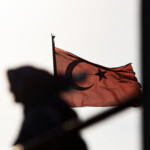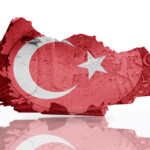‘The Turkish government is unlikely to ease up on its domestic repression. Since President Erdoğan’s reelection, crackdowns on civil society and journalists have, if anything, intensified. It is crystal clear that the government’s approach to policing and criminalizing dissent at home will remain the same.’
If many international observers are hoping for a new moderation in Turkish foreign policy, and investors are anxiously trying to determine how serious the Erdoğan government is about “a return to orthodoxy” in economic policy, few are holding out much hope for any retreat from the Turkish government’s repression at home.
Prominent opposition politicians and civil society leaders, including Selahattin Demirtaş and Osman Kavala, remain in prison, despite European Court of Human Rights rulings demanding that they be set free. Indeed, in the weeks since President Recep Tayyip Erdoğan was reelected, crackdowns on civil society and journalists have, if anything, intensified.
The Turkish government has taken advantage of Pride Month celebrations to underscore the “anti-LGBT” messaging that Erdoğan emphasized as part of his presidential campaign. Using tropes and messaging borrowed from abroad, including the United States, the government and its allies have portrayed LGBT rights as an effort by an international cabal to undermine Turkey’s national values. Pride Month celebrations and marches were banned and hundreds detained as part of a crackdown that was celebrated in the government press.
If the crackdown on the Pride celebrations was one early salvo in the Justice and Development Party’s (AKP) campaign to retake control of major municipalities — and especially Istanbul — in the municipal elections scheduled for March 2024, another leg of this campaign is the continued prosecution of Istanbul’s popular and charismatic mayor, Ekrem İmamoğlu. İmamoğlu has already been found guilty and sentenced to two years in prison, along with a political ban, for comments criticizing the Supreme Electoral Board for its attempt to overturn the 2019 municipal election that eventually brought him to power. He is currently free on appeal. A new set of charges, ironically accusing İmamoğlu of the kind of corruption that the ruling party has honed to a fine art, was brought last month and alleges irregularities in the awarding of public tenders.
The Turkish government has, since the election, also extended its crackdown on independent journalism. In the weeks after the election, the Radio and Television High Council (RTÜK) imposed fines on the handful of independent broadcasters that had run coverage critical of the AKP.
Merdan Yanardağ, a respected journalist and television personality, was detained the day after he made comments on live television that were critical of Turkey’s treatment of jailed Kurdistan Workers’ Party (PKK) leader, Abdullah Öcalan, on charges of “praising criminal activity.”
Another aspect of Turkey’s tightening control over media has been the regular use of news bans and the blocking of websites with unfavorable coverage. Most recently, the government has responded to a Reuters report on a joint U.S.-Swedish investigation into a corruption case that has implicated President Erdoğan’s son, Bilal.
It blocked not only Reuters’s own reporting but scores of reports, tweets, and YouTube videos that mentioned it and imposed a broad news ban on any reporting of the subject — though Turkish news channels devoted significant time to damning the report as an attempt to sully Turkey’s national honor. Clearly, this case in particular has hit a nerve with the ruling party.
It remains to be seen how far Turkey’s purported post-election reset will go in foreign and economic policy; it is crystal clear that the government’s approach to policing and criminalizing dissent at home will remain the same.
This article was originally published by the Middle East Institute.
The views and opinions expressed above are the author’s and do not represent those of the Free Turkish Press.


